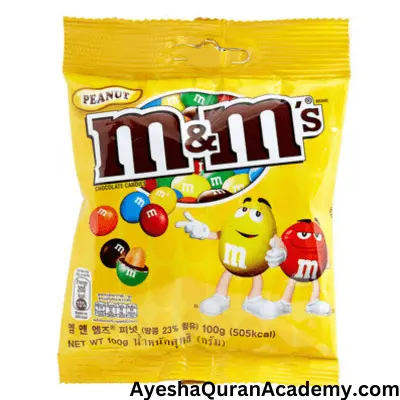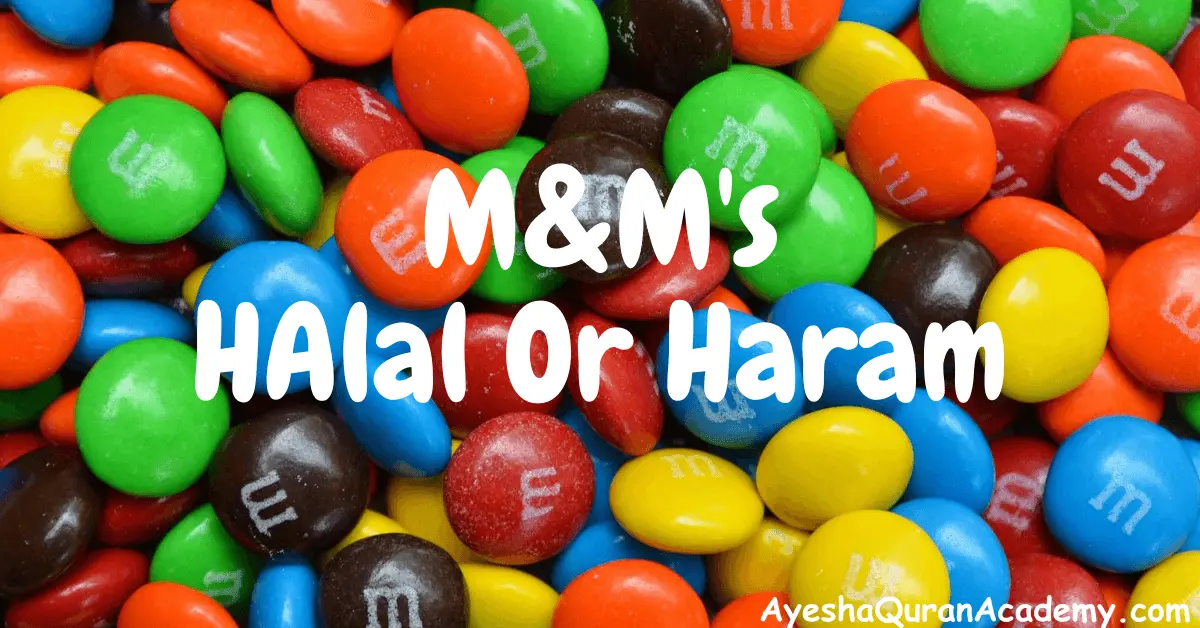M&M’s are one of the most popular chocolate candies in the world, loved by millions of people for their colorful shells and delicious fillings.
But for Muslims who follow the Islamic dietary laws of halal and haram, M&M’s may pose a challenge. Are M&M’s halal or haram? What are the ingredients that make them questionable?
And are there any differences between the M&M’s sold in different countries? In this article, we will explore these questions and more, and provide you with some useful information to help you make an informed decision about consuming M&M’s.
Are M&M’s Halal or Haram?
The answer to this question is not straightforward. While some ingredients of M&M’s are clearly halal or haram, others are more ambiguous or controversial.
Therefore, different opinions may exist among Muslim scholars and consumers regarding the halal status of M&M’s.
Here is a table of some common ingredients in M&M’s and whether they are considered Halal or Haram:
| Ingredient | Halal or Haram |
|---|---|
| Milk Chocolate (sugar, chocolate, cocoa butter, skim milk, lactose, milkfat) | Halal |
| Peanuts | Halal |
| Soy Lecithin | Halal |
| Salt | Halal |
| Sugar | Halal |
| Cornstarch | Halal |
| Palm Oil | Halal |
| Corn Syrup | Halal |
| Dextrin | Halal |
| Carnauba Wax | Halal |
| Gum Acacia | Halal |
| Carmine (E120) | Haram |
| Gelatin (if derived from pork or non-Halal sources) | Haram |
| Alcohol-based Flavors | Haram |
Please note that this is not an exhaustive list and the Halal or Haram status of a product can depend on more factors than just its ingredients, such as the way it was processed or manufactured.
Flavors
As we can see, most of the flavors used in M&M’s are natural and derived from halal sources.
However, some flavors may contain alcohol or other haram additives or contaminants.
Therefore, some Muslims may avoid M&M’s that contain these flavors unless they are certified halal by a reliable authority.

Are M&M’s Halal in Different Countries?
Another factor that may affect the halal status of M&M’s is the country where they are sold.
Different countries may have different regulations and standards for food production and labeling.
Moreover, different countries may have different sources and suppliers for the ingredients of M&M’s. Therefore, some M&M’s may be halal in one country but not in another.
Are M&M’s Halal In The USA
For example, in the United States, M&M’s are manufactured by Mars Wrigley Confectionery, a subsidiary of Mars Incorporated.
According to their website, they do not use any animal-derived ingredients in their chocolate products, except for milk and milk products. They also state that they do not use any alcohol or pork-derived ingredients in their products.
However, they do not claim that their products are halal certified, nor do they provide any information about the origin and processing of their ingredients.
Therefore, some Muslims may be cautious about consuming M&M’s in the United States, unless they find a reliable halal certification on the packaging.
Are M&M’s Halal In The UK
In the United Kingdom, M&M’s are manufactured by Mars Chocolate UK Ltd., another subsidiary of Mars Incorporated.
According to their website, they do not use any animal-derived ingredients in their chocolate products, except for milk and milk products.
They also state that they do not use any alcohol or pork-derived ingredients in their products.
However, they do claim that some of their products are suitable for vegetarians and have been approved by the Vegetarian Society.
They also provide a list of their vegetarian products on their website, which includes most of the varieties of M&M’s.
Therefore, some Muslims may be more confident about consuming M&M’s in the United Kingdom, as they have some assurance that the products are free from animal-derived ingredients.
Are M&M’s Halal In Canada And Australia
In Canada and Australia, M&M’s are manufactured by Mars Canada Inc. and Mars Australia Pty Ltd., respectively. Both of these subsidiaries are part of Mars Incorporated as well.
According to their websites, they do not use any animal-derived ingredients in their chocolate products, except for milk and milk products.
They also state that they do not use any alcohol or pork-derived ingredients in their products.
However, they do not claim that their products are halal certified, nor do they provide any information about the origin and processing of their ingredients.
Therefore, some Muslims may have the same concerns as those in the United States about consuming M&M’s in Canada and Australia.
Are M&M’s Halal In Arab Countries
In Arab countries, such as Saudi Arabia, UAE, Kuwait, Qatar, Bahrain, Oman, Egypt, Jordan, Lebanon, and Morocco, M&M’s are manufactured by Mars GCC FZE, a subsidiary of Mars Incorporated based in Dubai.
According to their website, they do use some animal-derived ingredients in their chocolate products, such as gelatin and carmine. They also state that they use alcohol as a carrier for some of their flavors.
However, they do claim that their products are halal certified by various authorities, such as the Islamic Food and Nutrition Council of America (IFANCA), the Halal Food Council International (HFCI), the Halal Certification Services (HCS), and the Emirates Authority for Standardization and Metrology (ESMA).
They also provide a list of their halal-certified products on their website, which includes most of the varieties of M&M’s.
Therefore, some Muslims may be more comfortable about consuming M&M’s in Arab countries, as they have some evidence that the products comply with the Islamic dietary laws.
Are M&M’s Halal In Other Muslim Countries
In other Muslim countries, such as Pakistan, Indonesia, Malaysia, Turkey, Iran, and Bangladesh, M&M’s may be imported from different sources or manufactured locally by different companies.
Therefore, the halal status of M&M’s may vary depending on the country and the product. Some M&M’s may be halal certified by local authorities or international organizations, while others may not.
Some M&M’s may have different ingredients or formulations than those sold in other countries, while others may not.
Therefore, Muslims should always check the labels and the packaging of M&M’s before buying or consuming them.
They should also look for any halal certification or indication of the ingredients and the source of the product.
Which M&M’s are Halal?
Based on the information we have gathered so far, we can conclude that there is no definitive answer to the question of which M&M’s are halal.
Different types of M&M’s may have different ingredients that may be halal or haram depending on the source and the processing of the ingredients.
Many different countries may have different regulations and standards for food production and labeling that may affect the halal status of M&M’s.
Different authorities may have different criteria and methods for halal certification that may vary in their reliability and validity.
Therefore, the best way to determine which M&M’s are halal is to do your own research and investigation before buying or consuming them.
You should always read the labels and the packaging of M&M’s carefully. And you should look for any information about the ingredients, the source, and the halal certification of the product.
And you should also consult with your local Islamic scholars or organizations for their opinions and guidance on the halal status of M&M’s.
You should also use your own judgment and conscience to decide whether you are comfortable with consuming M&M’s or not.
What Quran Says About M&M’s?
Ultimately, the decision to consume M&M’s or not is a personal one that depends on your level of knowledge, faith, and practice of Islam. As Allah says in the Quran:
“O you who have believed, eat from the good things which We have provided for you and be grateful to Allah if it is [indeed] Him that you worship.”
(Quran 2:172)
“And do not eat of that upon which the name of Allah has not been mentioned, for indeed, it is grave disobedience. And indeed do the devils inspire their allies [among men] to dispute with you. And if you were to obey them, indeed, you would be associators [of others with Him].”
(Quran 6:121)
“Say, ‘I do not find within that which was revealed to me [anything] forbidden to one who would eat it unless it be a dead animal or blood spilled out or the flesh of swine – for indeed, it is impure – or it is [that slaughtered in] disobedience, dedicated to other than Allah. But whoever is forced [by necessity], neither desiring [it] nor transgressing [its limit], then indeed, your Lord is Forgiving and Merciful.’”
(Quran 6:145)
Conclusion
M&M’s are a sweet treat that may have a halal dilemma for Muslims who follow Islamic dietary laws.
The ingredients of M&M’s may vary depending on the type and the country of origin.
And some of them may be halal or haram depending on the source and the processing of the ingredients.
Moreover, the halal certification of M&M’s may vary depending on the authority and the criteria that are used to verify compliance with Islamic dietary laws.
Therefore, Muslims should always do their own research and investigation before buying or consuming M&M’s.
They should look for any information about the ingredients, the source, and the halal certification of the product.
They should also consult with their local Islamic scholars or organizations for their opinions and guidance on the halal status of M&M’s.
And they should also use their own judgment and conscience to decide whether they are comfortable with consuming M&M’s or not.
FAQs
Some supermarkets and specialty stores might carry halal-certified M&M’s. Additionally, you can check online stores that specialize in halal products for more options.
While M&M’s themselves might be halal, it’s always good to be mindful of the sourcing and production practices of the company. Opt for products that align with your ethical values.
Islamic scholars generally agree that M&M’s are permissible as long as they meet the halal criteria. However, if you have doubts, you can consult your local religious authority for guidance.
Sharing M&M’s with non-Muslim friends is fine, as long as the M&M’s themselves are halal. It’s a way to foster understanding and friendship among different cultures and beliefs.
Different flavors and varieties of M&M’s might have slightly varying ingredients. Always read the ingredient list and look for halal certifications to ensure compliance with Islamic dietary guidelines.
When choosing M&M’s, make sure to check the ingredient list for any non-halal ingredients like gelatin or alcohol-based flavorings. Look for products with reliable halal certifications if you’re unsure.


